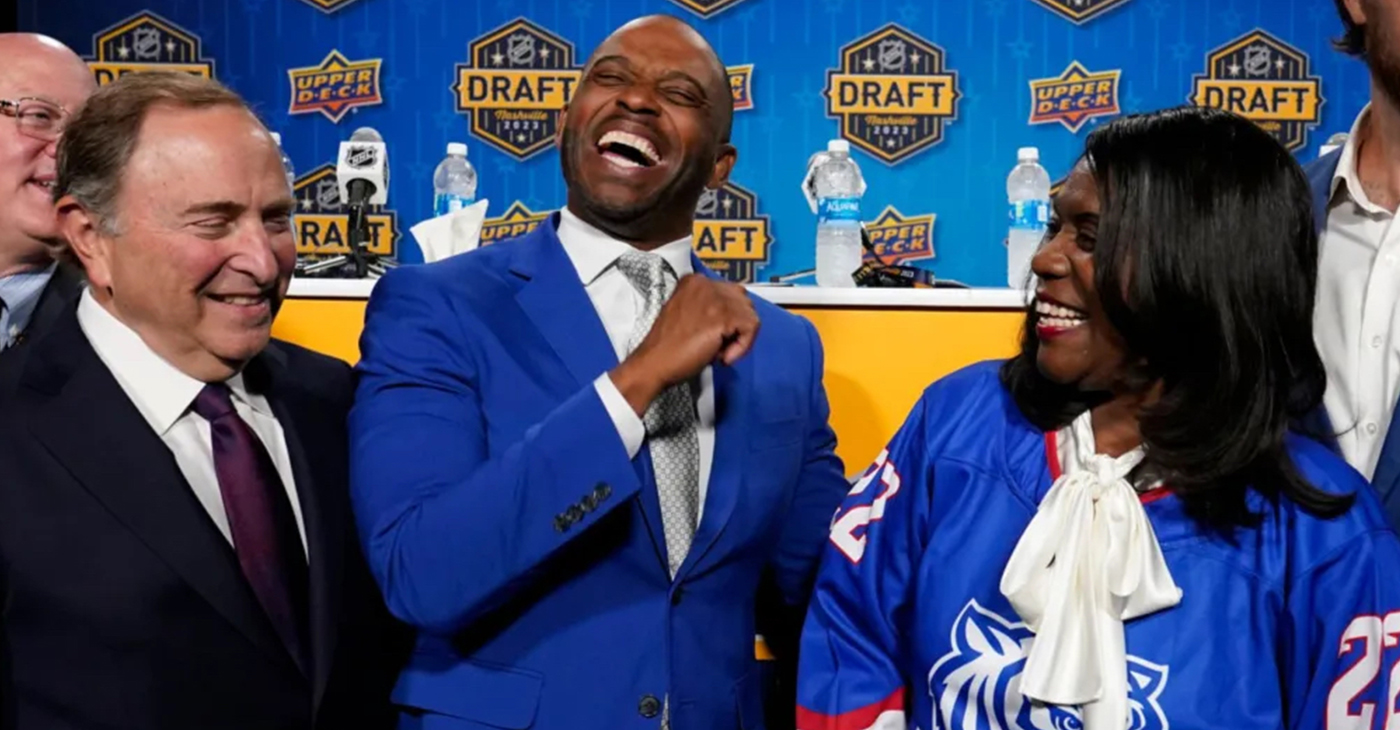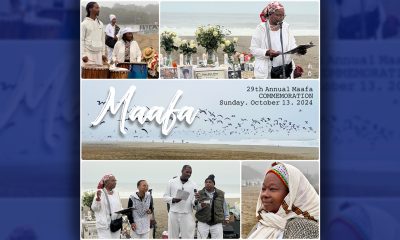National
Rough Ride? Lawyer Says Fatally Injured Arrestee Lacked Belt

A protestor holds a sign outside of Baltimore’s City Hall before a march for Freddie Gray, Thursday, April 23, 2015, in Baltimore. Gray died from spinal injuries about a week after he was arrested and transported in a police van. (AP Photo/Patrick Semansky)
JULIET LINDERMAN, Associated Press
CURT ANDERSON, Associated Press
BALTIMORE (AP) — No video captured what happened to Freddie Gray inside the police van where officers heaved him into a metal compartment after pinning him to a sidewalk. The cause of his fatal spine injury has not been revealed.
But a troubling detail emerged as hundreds of protesters converged on City Hall again Thursday: He was not only handcuffed and put in leg irons, but left without a seat belt during his trip to the station.
Unbelted detainees have been paralyzed and even killed by rough rides in police vans.” It even has a name: “nickel rides,” referring to cheap amusement park thrills.
Police brutality against prisoners being transported was addressed just six months ago in a plan released by Baltimore officials to reduce this misconduct. Department rules updated nine days before Gray’s arrest clearly state that all detainees shall be strapped in by seat belts or “other authorized restraining devices” for their own safety after being arrested.
Gray was not belted in, said attorney Michael Davey, who represents at least one of the officers under investigation.
But he took issue with the rules.
“Policy is policy, practice is something else,” particularly if a prisoner is combative, Davey told The Associated Press. “It is not always possible or safe for officers to enter the rear of those transport vans that are very small, and this one was very small.”
Commissioner Anthony Batts said there are no circumstances under which a prisoner should not be wearing a seatbelt during transport.
“He wasn’t wearing a seatbelt and that’s part of our investigation,” Batts told The Associated Press on Thursday. “It’s our responsibility to make sure people are safely transported, especially if their hands are behind their back.”
Batts also said another man who was in the van during the tail end of Gray’s ride told investigators that Gray was “was still moving around, that he was kicking and making noises” up until the van arrived at the station.
But Batts was careful to say that the investigation includes “everything the officers did that day.”
The Gray family’s lawyer, Billy Murphy, said “his spine was 80 percent severed” while in custody. It’s not clear whether he was injured by officers in the street or while being carried alone in the van’s compartment.
But if it happened on the way to the station, it wouldn’t be the first such injury in Baltimore: Dondi Johnson died of a fractured spine in 2005 after he was arrested for urinating in public and transported without a seat belt, with his hands cuffed behind his back.
“We argued they gave him what we call a ‘rough ride,'” at high speed with hard cornering, said Attorney Kerry D. Staton. “He was thrown from one seat into the opposite wall, and that’s how he broke his neck.”
Staton obtained a $7.4 million judgment for the family, later reduced to the legal cap of $200,000.
It also has happened in Philadelphia, where police in 2001 barred transportation of prisoners without padding or belts after The Philadelphia Inquirer reported that the city had paid $2.3 million to settle lawsuits over intentionally rough rides, which permanently paralyzed two people.
Gray fled on foot and was captured on April 12 after an officer “made eye contact” with him outside a public housing complex, police said. Videos show Gray screaming on the ground before being dragged, his legs limp, into a van. Witnesses said he was crying out in pain.
Kevin Moore, a friend of Freddie Gray’s who recorded video of his arrest, told The Baltimore Sun that police had Gray’s legs bent “like he was a crab or a piece of origami.”
Police procedures require officers to get immediate medical help if detainees need it, and to avoid aggravating any injury.
In Gray’s case, he repeatedly asked for help during the trip, but the driver instead diverted to another location to pick up another prisoner.
For the first time, the fire department released a timeline for paramedics’ response. Gray was arrested at 8:42 a.m. Paramedics received a call for an unconscious male at 9:26 a.m., Baltimore City Fire Department spokesman Captain Roman Clark said.
Medics arrived at the police station at 9:33 a.m., but didn’t leave for the hospital until 9:54, arriving roughly an hour and 20 minutes after his arrest. Clark didn’t say why it took more than 20 minutes to leave for the hospital once paramedics arrived.
“How did his injuries occur?” said Robert Stewart, a former chief who consults with police and the Justice Department on use of force. “These guys are picking up someone who is obviously injured.”
The driver also has a responsibility to refuse to take a seriously injured prisoner to the station if he belongs in a hospital, Stewart said.
“If I’m the officer in the wagon, if the guy’s hurt, I’m not taking him,” he explained.
All six officers involved in Gray’s arrest have been suspended with pay while under criminal investigation. Davey, whose firm is on contract with the Baltimore Fraternal Order of Police Lodge 3, said five of the six officers gave voluntary statements the day of Gray’s arrest, and one — he didn’t say who — declined to speak with investigators.
It’s quite common for prisoners to yell and complain, saying they’ve been injured or feel sick or that their handcuffs are too tight.
“You have to make a judgment call: is this a tactic, something to distract me?” said Lt. Luis Fuste of the Miami-Dade Police Department. “You’re taught that these things are often done with an ulterior motive.”
Yet Fuste and other law enforcement experts say rough rides aren’t typical, and aren’t worth the trouble to officers.
“Once he is a prisoner he is absolutely your responsibility,” said Peter Moskos, a former Baltimore officer who teaches law and police science at John Jay College of Criminal Justice in New York. “Even if there was no malign intent, even if there was no assault, he’s your prisoner. He goes into the wagon alive, he can’t come out dead.”
The Department of Justice is investigating whether Gray’s civil rights were violated, and an internal police investigation will be delivered by May 1 to the state’s attorney’s office, which will consider filing any criminal charges.
But some details have already been made public as authorities try to restore trust with a community demanding transparency and justice.
Commissioner Anthony Batts said Monday that officers repeatedly ignored Gray’s requests for medical attention before he was hospitalized in critical condition. “He asked for an inhaler, and at one or two of the stops it was noticed that he was having trouble breathing,” Batts said. “We probably should have asked for paramedics.”
___
Associated Press Writers Dave Dishneau and Jeff Horwitz contributed to this story from Baltimore. Anderson reported from Miami. They can be reached at http://twitter.com/Miamicurt, http://twitter.com/ddishneau and http://twitter.com/JulietLinderman
Copyright 2015 The Associated Press. All rights reserved. This material may not be published, broadcast, rewritten or redistributed.
Activism
Oakland Post: Week of November 20 – 26, 2024
The printed Weekly Edition of the Oakland Post: Week of November 20 – 26, 2024

To enlarge your view of this issue, use the slider, magnifying glass icon or full page icon in the lower right corner of the browser window. ![]()
#NNPA BlackPress
PRESS ROOM: Clyburn, Pressley, Scanlon, Colleagues Urge Biden to Use Clemency Power to Address Mass Incarceration Before Leaving Office
NNPA NEWSWIRE — Mass incarceration remains a persistent, systemic injustice that erodes the soul of America. Our nation has the highest incarceration rate in the world, with nearly two million people locked in jails and prisons throughout the country.

Read the letter here.
Watch the press conference here.
WASHINGTON, DC – Today, Congressman James E. Clyburn (SC-06), Congresswoman Ayanna Pressley (MA-07), and Congresswoman Mary Gay Scanlon (PA-05) led 60 of their colleagues in sending a letter to President Biden urging him to use his executive clemency power in the final months of his presidency to reunite families, address longstanding injustices in our legal system, and set our nation on the path toward ending mass incarceration.
The lawmakers hosted a press conference earlier today to discuss the letter. A full video of their press conference is available here and photos are available here.
“Now is the time to use your clemency authority to rectify unjust and unnecessary criminal laws passed by Congress and draconian sentences given by judges,” the lawmakers wrote in their letter. “The grant of pardons and commutations and the restoration of rights will undoubtedly send a powerful message across the country in support of fundamental fairness and furthering meaningful criminal justice reform.”
Mass incarceration remains a persistent, systemic injustice that erodes the soul of America. Our nation has the highest incarceration rate in the world, with nearly two million people locked in jails and prisons throughout the country. The extreme use of incarceration has resulted in one in two adults having had an incarcerated family member. People of color are disproportionately put behind bars, along with individuals from low-income communities, LGBTQIA+ folks, and those with disabilities. The bloated prison system reflects and emboldens biases that undermine the ideals of our nation and diminish trust in the rule of law. Mass incarceration attacks the most vulnerable Americans, thereby destabilizing families and inflicting intergenerational trauma.
In their letter to President Biden, the lawmakers praised the President’s efforts to create a fair and just criminal legal system by pardoning people convicted of simple marijuana possession and LGBTQ+ former servicemembers and urged the President to use his clemency powers to help broad classes of people and cases, including the elderly and chronically ill, those on death row, people with unjustified sentencing disparities, and women who were punished for defending themselves against their abusers. The lawmakers also outlined the fiscal toll of the growing mass incarceration crisis.
“You have the support of millions of people across the country who have felt the harms of mass incarceration: young children longing to hug their grandparents, people who have taken responsibility for their mistakes, and those who simply were never given a fair chance,” the lawmakers wrote. “These are the people seeking help that only you can provide through the use of your presidential clemency power.”
Joining Representatives Clyburn, Pressley, and Scanlon in sending the letter are Representatives Joyce Beatty, Sanford Bishop, Shontel Brown, Cori Bush, André Carson, Troy Carter, Yvette Clarke, Jasmine Crockett, Valerie Foushee, Al Green, Jahana Hayes, Steven Horsford, Jonathan Jackson, Pramila Jayapal, Henry Johnson, Sydney Kamlager-Dove, Robin Kelly, Summer Lee, Jennifer McClellan, Gregory Meeks, Delia Ramirez, Jan Schakowsky, Robert Scott, Terri Sewell, Marilyn Strickland, Bennie Thompson, Rashida Tlaib, and Bonnie Watson Coleman.
The lawmakers’ letter is supported by the American Civil Liberties Union; Center for Popular Democracy; Last Prisoner Project; Lawyers’ Committee for Civil Rights Under Law; Death Penalty Action; The National Council for Incarcerated and Formerly Incarcerated Women and Girls; The Faith Leaders of Color Coalition; Second Chance Justice of MCAN; JustLeadershipUSA; FAMM; The Episcopal Church; The Bambi Fund; Free Billie Allen Campaign; People’s Coalition for Safety and Freedom; Prophetic Resistance Boston; and Families Against Mandatory Minimums.
#NNPA BlackPress
Tennessee State University Set to Debut the First Division I Hockey Team at An HBCU
THE AFRO — “I am incredibly excited to embark on building this program, supported by God, my family, TSU students, alumni, and all those eagerly awaiting this moment,” said Duanté Abercrombie, the head coach of the Tennessee State Tigers ice hockey team, in a press release courtesy of TSU Athletics. “I firmly believe that one day, TSU will be recognized not only as a powerhouse on the ice but also as a program whose student-athletes leave a profound legacy on the world, enriched by the lessons learned at TSU.”

By Mekhi Abbott
Special to the AFRO
mabbott@afro.com
Tennessee State University (TSU) continues to break ground on a historic journey to become the first historically Black college or university (HBCU) to field a National Collegiate Athletic Association Division I ice hockey team. Alongside some assistance from the National Hockey League (NHL), the NHL Players’ Association and the Nashville Predators, the TSU Tigers have already named their official head coach, unveiled their jersey and received their first official commitment from a student-athlete.
TSU held an official press conference to announce the plan in June 2023. Their first official season as a sanctioned Division I program is planned to commence in 2025-26. On April 18, TSU named Duanté Abercrombie as the head coach of the Tennessee State Tigers ice hockey team.
“I am incredibly excited to embark on building this program, supported by God, my family, TSU students, alumni, and all those eagerly awaiting this moment,” said Abercrombie in a press release courtesy of TSU Athletics. “I firmly believe that one day, TSU will be recognized not only as a powerhouse on the ice but also as a program whose student-athletes leave a profound legacy on the world, enriched by the lessons learned at TSU.”
Abercrombie was raised in Washington, D.C., and was mentored by hockey legend Neal Henderson, the first Black man to be inducted into the United States Hockey Hall of Fame. Abercrombie attended Gonzaga College High School and graduated from Hampton University, where he was a track and field athlete prior to retiring due to an injury. After college, Abercrombie briefly played professional hockey in both the New Zealand Ice Hockey League as well as the Federal Hockey League.
After his career as a professional hockey player, Abercrombie moved onto coaching, including stints with his alma mater Gonzaga and Georgetown Preparatory School. In 2022-23, Abercrombie was a member of the coaching staff for NHL’s Toronto Maple Leafs organization.
“We are no longer doing club play in 2024-25. We are going right into D1 play for 2025-26,” Nick Guerriero told the AFRO. Guerriero is the assistant athletic director of communications and creative content at Tennessee State.
On Jan. 19, TSU got their first official commitment from an ice hockey recruit, Xavier Abel. Abel played at Drury University and scored 12 goals in 34 games, including three game-winning goals. Abel was recruited by Guerriero.
In July, the Tigers got their second commitment from forward Trey Fechko. In October, Trey’s brother Marcus Fechko also committed to Tennessee State. Since, the Tigers have also signed forward Greye Rampton, goaltender Johnny Hicks, Grady Hoffman and four-star forward Bowden Singleton. Singleton flipped his commitment from North Dakota to Tennessee State. Guerriero said that TSU has a “few” other recruits that they are waiting to announce during their November signing period.
“I think it’s important to invest in these unorthodox sports for Black athletes because it allows Black children to have more opportunities to play sports in general,” said Zion Williams, a 2024 Gettysburg College graduate and former collegiate athlete. “The more opportunities that children have, the better. They won’t feel like they are boxed into one thing or sport.”
-

 Alameda County4 weeks ago
Alameda County4 weeks agoAlameda County District Attorney Pamela Price Announces $7.5 Million Settlement Agreement with Walmart
-

 Activism3 weeks ago
Activism3 weeks ago‘Jim Crow Was and Remains Real in Alameda County (and) It Is What We Are Challenging and Trying to Fix Every Day,’ Says D.A. Pamela Price
-

 Bay Area4 weeks ago
Bay Area4 weeks agoIn the City Attorney Race, Ryan Richardson Is Better for Oakland
-

 Activism3 weeks ago
Activism3 weeks agoOakland Post: Week of October 30 – November 5, 2024
-

 Alameda County3 weeks ago
Alameda County3 weeks agoD.A. Price Charges Coliseum Flea Market Vendors in Organized Retail Theft Case
-

 Activism3 weeks ago
Activism3 weeks ago‘Criminal Justice Reform Is the Signature Civil Rights Issue of Our Time,’ says D.A. Pamela Price
-

 Activism3 weeks ago
Activism3 weeks ago“Two things can be true at once.” An Afro-Latina Voter Weighs in on Identity and Politics
-

 Activism1 week ago
Activism1 week agoLIVE! — TOWN HALL ON RACISM AND ITS IMPACT — THURS. 11.14.24 5PM PST





















































